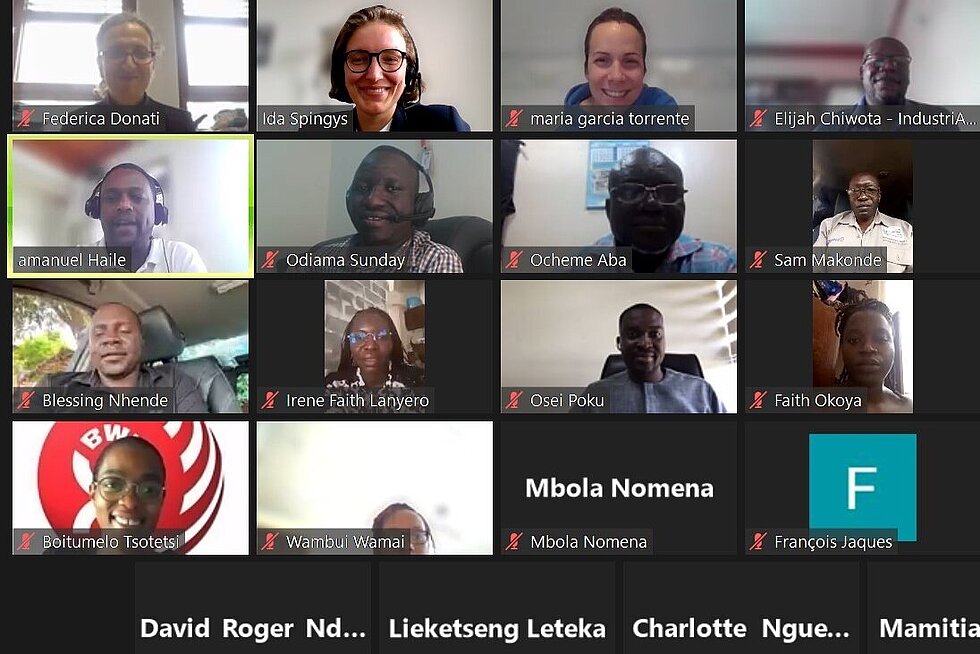TRADE UNIONS & SUBMITING (BUSINESS) HUMAN RIGHTS VIOLATIONS COMPLAINTS TO THE UN SPECIAL PROCEDURES
Together with the Sub-Saharan Africa Regional Office of IndustriALL and the United Nations Office of the High Commissioner for Human Rights (OHCHR), the FES-AU Office invited African trade unions to an online training on "Submitting Complaints to Special Procedures" in order to enable them to gain a better understanding of the existing UN Special Procedures and how to submit complaints when they become aware of (business) human rights abuses in their field of work. On the 27th of March 2024, more than 20 TU participants were introduced to existing online portal on where to submit complains to the Special Procedures.
Africa is experiencing a rapid economic growth since the 2000’s, where there is a growing presence of multinational corporations and business in the continent is evident. Millions of people across the board are benefiting from the job opportunities, however, what comes along is the rise of human right violations within the business conduct. Recent litigations in Africa have shown that business violations of human rights form a significant proportion of right to development infringement on the African continent.
In order to be effective in the dealing with human rights violations emanating from the activities of businesses, the UN has endorsed the UNGPs on B&HRs in 2014 as a global policy tool to account, manage, track and govern human rights violations within the business conduct. Apart from the global and regional frameworks, it is equally important to understand mechanisms and instruments that exist within the UN system, mainly to inform, record and report human right violations in the context of business operations. There is a globally accepted quote ‘’ If it is not documented and reported, it didn’t happen’’, which is to imply the importance of knowing UN special procedure and mechanism to report violation.
Workers and employees are at the receiving end of human right violations and as such, the majority of violations are neither documented nor reported. This is mainly attributed to, in fact, the absence of legal policy framework, but also lack of knowledge and information on technical matters, such as the UN special procedures and compliant mechanism. There are Special Procedures mechanisms that can intervene directly with States and non-State actors, including business enterprises and intergovernmental organizations, on alleged human rights abuses that fall within their mandates, through an exchange of letters.
.
The Special Procedures of the Human Rights Council are independent human rights experts who:
- monitor the situation in countries through visits;
- act on complaints of alleged human rights violations by sending communications;
- conduct thematic studies and organize expert consultations;
- contribute to the development of international human rights standards;
- engage in advocacy and raise public awareness;
- and provide advice for technical cooperation to Governments.
After reviewing the submitted complains and with the support of the OHCHR, special procedures undertake country visits, act on individual cases of reported violations and concerns of a broader nature by sending communications to States and others Contribute to the development of international human rights standards, and engage in advocacy, raise public awareness, and provide advice for technical cooperation.
The FES AU office has been working with the African Union, UNOHCHR and ITUC African to create a platform where TUs become familiar about the continental and global policy instruments governing the conduct of business while respecting human rights.
We express our heartfelt gratitude to all participants for their active engagement during the discussions. Special thanks are extended to the resource persons from OHCHR and IndustriALL for their insightful inputs.
Amanuel Desalegne, Program Manager, FES AU Cooperation Office
Friedrich-Ebert-Stiftung African Union Cooperation
Arada Kifleketema
Queen Elizabeth II street
P.O. Box 8786
Addis Ababa, Ethiopia



